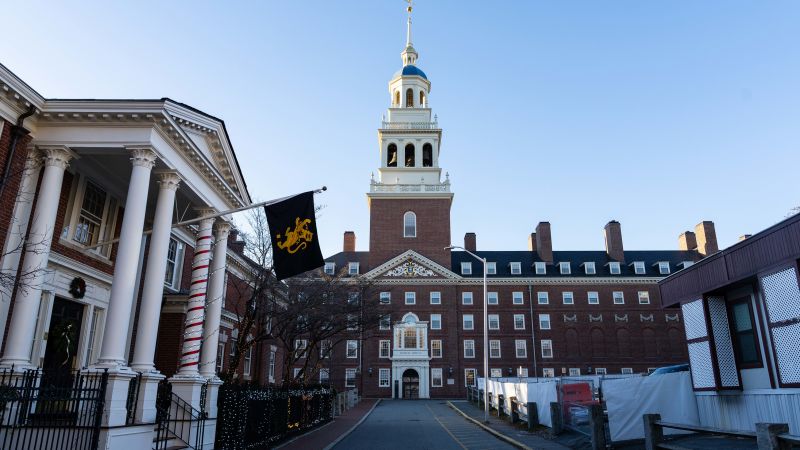The Harvard brand, one of the most prestigious among all universities, took nearly 400 years to build. But it’s taken just three months to call that brand very much into question.
The university’s initial response to the October 7 terror attack on Israel was criticized, even by its own top board. Harvard President Claudine Gay’s testimony before Congress was an unmitigated disaster. And now Gay is mired in a plagiarism scandal.
All of this has opened up Harvard to fierce criticism from politicians and alumni, some of whom have vowed to close their checkbooks.
One such Harvard graduate, venture capitalist and former Facebook executive Sam Lessin, told CNN he believes the university has “never been weaker” — and he’s pointing the finger at the very top.
“The Harvard brand is deeply embattled,” Lessin said in a phone interview. “Gay has demonstrated extreme weakness as an administrator and as a leader. The Harvard Corporation has not communicated well with the outside world.”
Lessin, who worked at Facebook from 2010 to 2014 before co-founding San Francisco-based Slow Ventures, is hoping to fix Harvard by getting elected to the university’s powerful Board of Overseers.
He’s scrambling to gather enough signatures to get on the ballot, a tall task made more plausible by growing dissatisfaction among rank-and-file alumni.
To make his case, Lessin pointed to a drop in early applications to Harvard that its rivals did not experience, as well as conversations with parents who say top students are rethinking whether they even want to go to the Ivy League school.
“It’s really sad,” he said. “I believe in Harvard. I love Harvard. But the university is clearly in a weak spot.”
Lessin described a culture of fear where some associated with the university are unwilling to speak out publicly.
“Everyone is terrified. It’s not a free-speech culture,” he said. “The irony is Gay is speaking about free speech but there is anything but free speech at Harvard.”
Last week, billionaire Len Blavatnik joined a growing list of frustrated Harvard donors closing their checkbooks to the school.
Blavatnik, who is Jewish and whose family foundation has donated at least $270 million to Harvard, is holding back donations until the university addresses antisemitism on campus, a person familiar with the matter previously told CNN.
Harvard’s board stands by Gay
Harvard, which has a massive endowment valued at a staggering $51 billion, did not respond to requests for comment on Lessin’s criticism.
Days after her controversial appearance before Congress, Gay apologized, telling The Harvard Crimson: “When words amplify distress and pain, I don’t know how you could feel anything but regret.”
On December 12, the Harvard Corporation issued a statement saying its members “unanimously stand in support of President Gay,” arguing she is the “right leader to help our community heal and to address the very serious societal issues we are facing.”
Last week, some key members of Harvard’s faculty and the Harvard Corporation held a meeting over dinner to discuss the problems at the school. During that meeting, Jeff Flier, a former dean of the Harvard Medical School, urged the board to address the problems at Harvard more directly.
“If people are saying the university is making mistakes — they are talking about you!” Flier said he told the Corporation members.
The pressure on Harvard and Gay has only been amplified by the plagiarism controversy.
Last week, Harvard announced Gay plans to submit corrections to her 1997 PhD dissertation due to “inadequate citation.” Those corrections come on top of ones Gay issued earlier this month to a pair of scholarly articles she wrote in the 2000s.
Harvard has described Gay’s corrections as “regrettable” but found the matter does not constitute research misconduct — a punishable offense.
Lessin, the former Facebook exec, called the plagiarism charges “pretty serious” and “very embarrassing” for Harvard.
He questioned why the Harvard Corporation did not uncover the plagiarism issue before hiring Gay just over a year ago.
“This is a real failure of the Corporation,” he said. “Their fate is very tied up with Gay’s, given the fact they did a search and selected her.”
Lessin compared the situation to that of the investors and celebrities who failed to thoroughly vet FTX, the crypto exchange that collapsed in November 2022.
“People just didn’t do their homework. It’s pretty clear the [Harvard] Corporation and the Overseers skipped a step,” Lessin said.
However, plagiarism experts interviewed by CNN were divided on what the punishment for Gay should be — or whether there should be one in the first place.
None of those experts argued Gay should be outright fired, and said it’s rare for academics to be fired or students to be expelled for plagiarism.
Gay has defended her writings.
“I stand by the integrity of my scholarship. Throughout my career, I have worked to ensure my scholarship adheres to the highest academic standards,” Gay said in a statement earlier this month.
Although Gay has faced calls for her resignation from some lawmakers and donors, earlier this month the Harvard president enjoyed strong support from hundreds of faculty members who signed a petition urging officials not to let her go.
During a virtual town hall Gay held with Harvard faculty last week, about a dozen faculty members spoke and all of them were supportive, a person familiar with the matter previously told CNN.
The plagiarism controversy swirling around Gay did not come up, the source said.
Read the full article here




